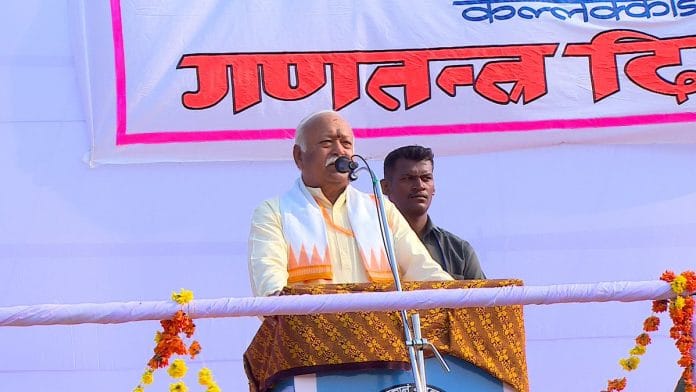For the first time, the RSS has come out into the political mainstream. So far the organisation pretended that it was only a cultural body.
Not only Narendra Modi and Amit Shah, but all political parties, leaders, commentators, media, social media, and the business elites are obsessed with 2019. I have covered almost all elections since 1971, but I have never seen such a pathological obsession. Except once, in 1977. But that is not comparable.
The reason was simple. The 1977 election was announced on 18 January, and held just two months later. The context was the Emergency and Indira Gandhi’s leadership.
Initially, when the election was announced, by none other than Gandhi herself, there was shock. She could have carried on for one more year. The Parliament’s duration had been extended and elections could be held in 1978. Nobody expected Gandhi would declare an election.
Many top leaders as well as activists of the opposition parties were still in jail. The media, except for a few newspapers, was controlled and mute. The ruling Congress was in awe of Indira and Sanjay Gandhi. There was the inspiring leadership of Jaiprakash Narayan without a united opposition. The Janata Party was yet to be formally born.
There was no chance of the Jan Sangh merging with the opposition, which included the Socialist Party, the Bharatiya Kranti Dal (BKD), the Congress (O), and the Swatantra Party. Non-Jan Sangh parties were suspicious of the Jan Sangh (JS) because of its deep-rooted ties with the RSS.
The non-Jan Sangh parties, which were merged into the Janata Party, demanded that the JS give up dual loyalties and membership. The JS refused and the Socialists, the BKD and some others forced a split. Morarji Desai had to step down. Charan Singh (BKD) became Prime Minister, but could not face Parliament even for a day because the Congress’ support was withdrawn almost immediately after his government was installed.
Madhu Limaye, the firebrand socialist leader, had raised the banner of revolt against the RSS in 1978, but it took about a year to spread the revolt, and collapse of the Janata Party came in 1979.
The epicentre of the quake in the Janata Party was in Nagpur, at the headquarters of the Rashtriya Swayamsevak Sangh.
That was four decades ago.
How ironic that the RSS is in the eye of the storm again. But this time, it is not the suspicion and isolation of the RSS, but the recognition and incorporation of the organisation that has started the debate about the 2019 election.
It is interesting that neither Modi nor Shah has reacted positively or negatively to Pranab Mukherjee’s speech at their ‘alma mater’?
The RSS caused ruptures in the Janata Party then and now it has sent shock waves in the Congress.
For the first time, the RSS has come out into the political mainstream. So far, the organisation has pretended that it is only a cultural body. Well, it may not have registered itself as a political party, but now it is being treated by all parties as a “party with a difference” in the true sense of the term. Indeed, many senior Sangh leaders have begun to see a quiet confrontation brewing between a non-political leader, Mohan Bhagwat, and hardcore power-seeker Narendra Modi.
That fall of the Charan Singh government forced elections in 1980. But that election, too, did not generate the kind of obsession we are seeing today. Gandhi came back to power, trouncing the opposition. The country was then ‘Janata Party-mukt’; today, there is not a single Janata MP or MLA or even corporator anywhere in the country. It was also seen as the defeat of the RSS politics led by Jan Sangh.
The party changed its tack and identity after that defeat and became the Bharatiya Janata Party. The term ‘janata’ was retained. The original Jan Sangh remained but as a sulking fiefdom of the veteran RSS/JS leader, Balraj Madhok, who was the founding father of the party.
The BJP as well as the RSS ignored, neglected and sidelined Madhok and Jan Sangh so completely that when he died, nobody from the parivar even attended his funeral. No tribute was paid to him.
The assassination of Gandhi in 1984 and Rajiv Gandhi in 1991 led to tremendous anxiety and uncertainty, but not the kind of hype and hyperbole seen now.
But, come to think of it, Modi started the 2019 campaign almost immediately after his sensational victory in 2014. He is a campaign champion and Amit Shah an election war machine.
Issues of governance, politics, economy, and ideology are irrelevant. What matters is winning the election, as the chief minister of Maharashtra, Devendra Fadanvis, said recently, deploy all means — sam-dam-dund-bhed — but we must win, at all costs. Every single policy or issue, from demonetisation to triple talaq, GST to Naxalism or Maoism, is debated with 2019 in focus. This includes the alleged assassination plot to attack Modi or border conflicts.
The opposition, forgetting or ignoring their personal and political agendas, are trying to forge unity. There indeed is widespread discontent and even the BJP juggernaut’s generals have realised that 2019 is a difficult call. Modi’s foreign jaunts for the so-called ‘informal summits’ are aimed at the Indian electorate and rival political parties. He also wants to constantly remind his own party that he is the ‘numero uno’.
So, yet again, the politics has centred on the RSS. A non-political body and an extra-constitutional centre of power is defining the 2019 mood and agenda. It is an achievement, howsoever dubious it may be.
Kumar Ketkar is a former editor and Congress member of Rajya Sabha.







Politics one does not understand, ideology one does not possess, but governance and the economy are the twin pillars on which continuing, sustainable electoral success rests. Ignore them completely at your peril. 2019 will deliver that sermon.